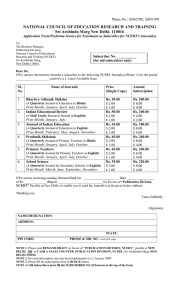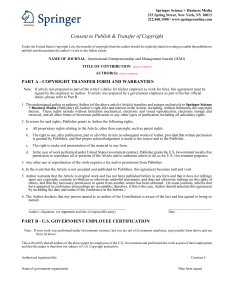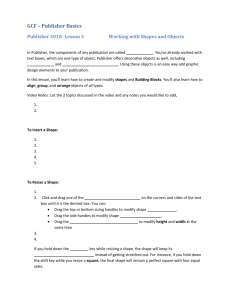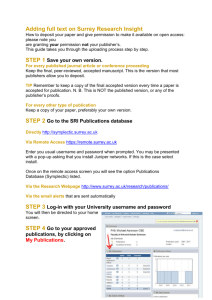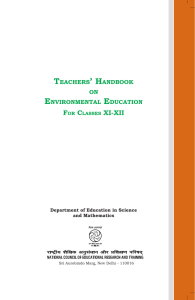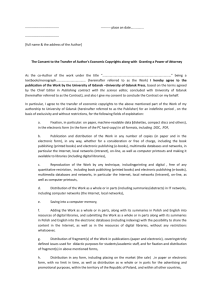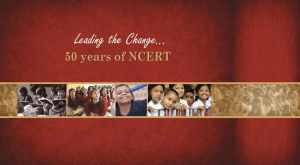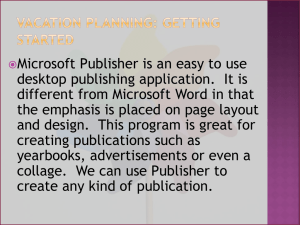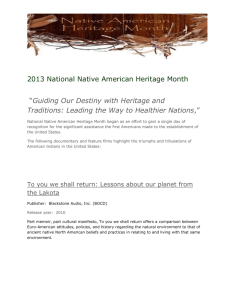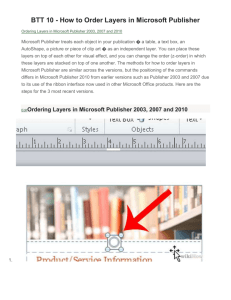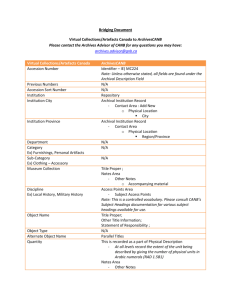G&C-Director -28 May 2012
advertisement
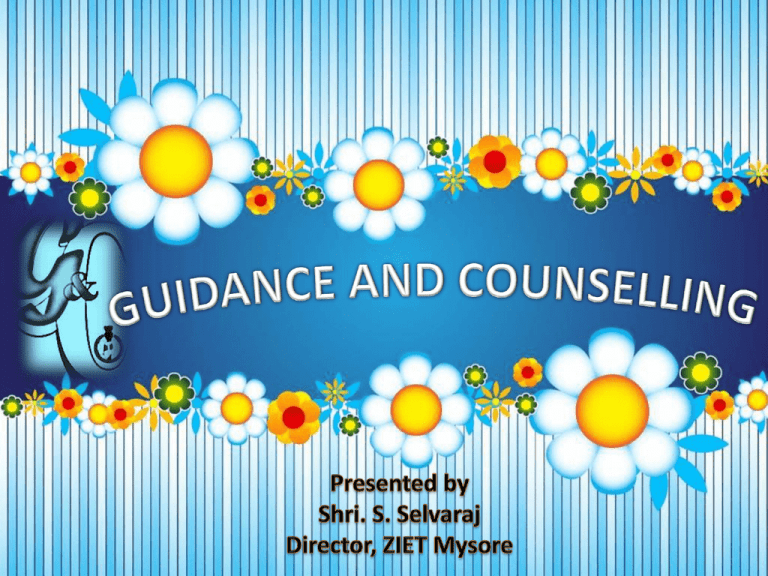
3 UNDERSTAND AND DEVELOP ALL ASPECTS OF THEIR PERSONALITY 2 HAVE SELF KNOWLEDGE AND PLAN REALISTIC LIFE GOALS 4 MAKE CHOICES ACCORDING TO THEIR TALENTS AND ABILITIES 1 UNDERSTAND AND DEVELOP ALL ASPECTS OF THEIR PERSONALITY JOIN THE WORK FORCE 5 MAKE CAREER CHOICES AT THE END OF SECONDARY SCHOOL EDUCATION OPT FOR VOCATIONAL COURSE OPT FOR HIGHER COURSES IN PREPARATION FOR COLLEGE The individual passes through various stages called Growth, Exploration, Establishment, Maintenance and Decline in the process of career development TO REALISE THE ULTIMATE GOAL OF EDUCATION FOR HOLISTIC DEVELOPMENT TO COPE AND ADJUST WITH SITUATIONS IN SCHOOL AND AT HOME FOR SETTLING THEM IN THE WORLD OF WORK BY GUIDING THROUGH THE GROWTH AND EXPLORATION STAGES OF THEIR CAREER FORDEVELOPING A REALISTIC SELF-CONCEPT ABOUT THEIR INTERESTS AND ABILITIES AND MAKE INFORMED CHOICES FOR INFORMATION ABOUT VARIOUS EDUCATIONAL AND VOCATIONAL POSSIBILITIES TO CHOOSE THE COURSE OF STUDY WHICH SUITS THEM BEST AT THE END OF CLASS XII Needs of the socio-economically weaker sections need to be identified and catered to Social implications- Disintegrating family backgrounds necessitate support systems to cope with the complexities of situations Guidance is meant for all students not just for those who deviate from the norm and hence a continuous and integral process SCHOOLS CAN APPROACH ANY OTHER AGENCY WHOSE SERVICES ARE REQUIRED CAN DIAGNOSE DIFFICULTIES AND PROBLEM AREAS IN LEARNING AND BEHAVIOUR CUSTOM SERVICES FOR THE GIFTED, THE CHALLENGED THE BACKWARD AND THE SPECIAL THE STAKEHOLDERS REPOSE MAXIMUM FAITH IN THE SCHOOLS FOR GUIDANCE SERVICES CAN GENERATE A DATA BASE AND INFORMATION ABOUT THE STUDENT EDUCATION INSTRUCTION Teaching function ADMINISTRATION Managerial function SERVICES Helping function in the social setting of the school Guidance is considered as an integral part of the total educational process in which the teacher, the parent, and the guidance counselor have important roles to play In order to achieve the all round development, which enables a child to be a fully functional individual, should take into consideration children’s internal and external environmental factors and influences. 4.ADJUSTMENTS Depression, Stress, Anxiety, Neglect, Abandonment, Anger, Guilt, Children of alcoholic parents, Fear, Backwardness, New schools, Moving, and Single parent families 1.DEVELOPMENTAL communication skills, Self concept, Life goals, Sexual values, Social skills, Multicultural awareness and Nutrition and Exercise. The role of psychotherapy in schools can’t be underestimated. in view of paucity of personnel in schools , teachers with the knowledge of identification aspect of psychological and developmental concerns which require long term therapy are required so that once such cases needing psychotherapy are identified they can be referred to outside agencies. A teacher wanting to take up guidance work needs to have certain characteristics and qualities. They are listed as follows: • Recognizing the basic dignity and worth of each individual student. • Non-judgmental attitude towards students. • Readily gives unconditional positive regard to students. • Genuine • Empathetic • Emotionally balanced Having high level of interpersonal skills • Self awareness • Open mindedness • Effective communication skills The following books on guidance and counseling are recommended for teachers: 1. ‘Guidance: An Introduction’ written by John J. Pietrofesa, Bianca Bernstein, JoAnne Minor, and Susan Stanford (all from Wayne State University). Publisher: Rand McNally College Publishing Company, Chicago, America. 2. ‘The Professional Counselor: A process guide to helping’ written by L. Sherilyn Cormier, West Virginia University, and Harold hackney, Fairfield University. Publisher: Allyn and Bacon, A division of Simen & Schuster, Inc. 160 Gueld Street, Needham Heights, Massachusetts 02194 3. ‘The Skilled Helper: A problem-management approach to helping’ written by Gerard Egan, Loyola University of Chicago. Publisher: Brooks/Cole Publishing Company, Pacific Grove, California. 4. ‘Manual for Guidance Counselors’ written by R. K. Saraswat and J. S. Gaur. Publisher: National Council of Educational Research and Training, NCERT campus, Sri Aurobindo Marg, New Delhi 110 016. 5. ‘Occupational Information in Guidance’ written by Gursharan Kaur Joneja. Publisher: National Council of Educational Research and Training, NCERT campus, Sri Aurobindo Marg, New Delhi 110 016. 6. ‘Counseling and Guidance’ written by S. N. Rao, Publisher: Tata McGraw Hill, Delhi. 7. ‘Readings for Career teachers’ written by S. Mohan. Publisher: National Council of Educational Research and Training, NCERT campus, Sri Aurobindo Marg, New Delhi 110 016.
